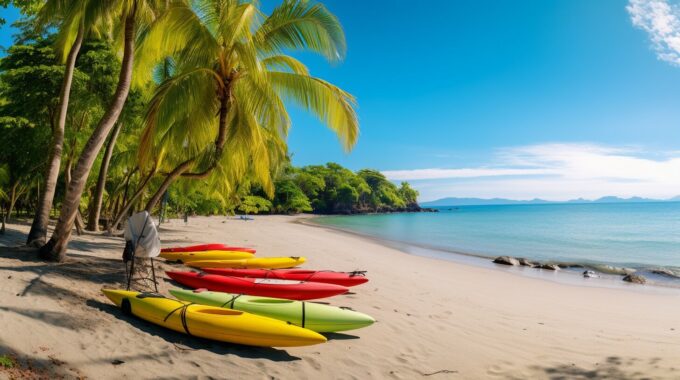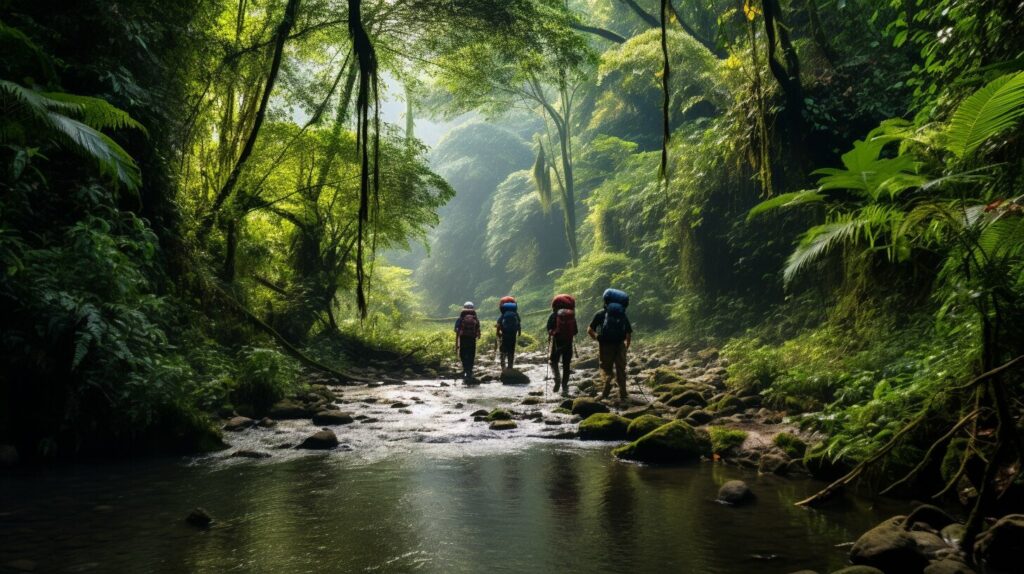At the forefront of property financing in Costa Rica, GapInvestments.com stands as a beacon for…

Exploring Safety in Costa Rica: Your Comprehensive Guide
Safety Precautions and Crime Rates in Costa Rica
While Costa Rica is generally considered safe, it is important to be aware of potential safety risks and take necessary precautions to ensure a secure visit. Petty theft, such as pickpocketing and purse snatching, can occur, especially in popular tourist areas. It is essential to remain vigilant and take precautions to protect your belongings.
Certain provinces, such as Alajuela, Limon, Puntarenas, and San Jose, are more affected by violent crime, primarily related to drug trafficking activities. Credit card and ATM fraud can also occur, so it is important to be cautious when using your cards.
Costa Rica is prone to natural hazards, such as earthquakes, volcanoes, and hurricanes, so it is crucial to stay informed about the current geological and weather conditions. Women traveling alone may face some forms of harassment and verbal abuse, particularly in certain areas. It is necessary to be cautious and avoid walking alone at night. Demonstrations can take place in Costa Rica, and it is advisable to avoid areas where demonstrations are happening. Costa Rica’s coastal waters can be dangerous, so it is important to exercise caution when swimming and only swim in designated areas.
Here are some safety measures and precautions to follow while visiting Costa Rica:
- Keep your belongings secure and avoid displaying expensive items.
- Be cautious of your surroundings, especially in crowded tourist areas.
- Use reliable transportation services and avoid unmarked taxis.
- Avoid walking alone at night, especially in unfamiliar or dimly lit areas.
- Keep a photocopy of your passport and other important documents in a safe place.
- Be cautious when using ATMs and cover the keypad when entering your PIN.
- Stay informed about the local weather conditions and follow any advisories or warnings.
- Respect local laws and customs, and be mindful of cultural sensitivities.
By taking these precautions and staying informed, you can have a safe and enjoyable trip to Costa Rica.
Safety in Costa Rica’s Natural Environment
In addition to crime-related safety concerns, visitors to Costa Rica should also be aware of the natural hazards and other safety considerations in the country. Costa Rica is known for its stunning natural beauty, but it is essential to take precautions and stay informed to ensure a safe and enjoyable experience.
Costa Rica is located in a seismically active zone, making it prone to earthquakes. It is essential to familiarize yourself with earthquake safety procedures and know the location of safe zones in the area you are visiting. Keep an eye on local news and heed any warnings or advisories issued by authorities. It is recommended to stay in hotels or accommodations that have been built to withstand earthquakes.
The country is also home to several active volcanoes, which can pose risks such as ashfall, gas emissions, and potential eruptions. Be aware of the volcano activity levels and follow any guidance or restrictions provided by local authorities. It is advisable to avoid venturing too close to volcanic areas, especially during periods of increased volcanic activity.
Costa Rica experiences occasional hurricanes and tropical storms, mainly between June and November. Stay updated on weather forecasts and follow the instructions of local authorities regarding evacuation or sheltering in place. If you plan to visit during hurricane season, consider purchasing travel insurance that covers trip cancellations or disruptions due to severe weather.
| Natural Hazards | Safety Tips |
|---|---|
| Earthquakes | – Familiarize yourself with earthquake safety procedures – Stay in accommodations built to withstand earthquakes – Stay informed about earthquake activity and follow local guidance |
| Volcanoes | – Be aware of volcano activity levels – Follow any guidance or restrictions from local authorities – Avoid venturing too close to volcanic areas |
| Hurricanes and Tropical Storms | – Stay updated on weather forecasts – Follow instructions from local authorities – Consider purchasing travel insurance for trip protection |
Tips for Adventure Safety and Respecting Local Culture
To ensure a safe and enjoyable adventure in Costa Rica, follow these helpful tips for adventure safety and cultural respect.
1. Choose reputable tour operators: When booking adventure activities, such as zip-lining, hiking, or white-water rafting, make sure to research and choose tour operators with excellent reviews and a good safety record. Ask about the equipment they use, the qualifications of their guides, and their adherence to safety regulations. Taking this precaution will help ensure a safe and enjoyable experience.
2. Be prepared and pack appropriately: Before heading out on your adventure, make sure you have the necessary gear and supplies. This may include items such as sunscreen, insect repellent, a first aid kit, proper footwear, and adequate clothing. Being prepared will help you stay comfortable, protect yourself from the elements, and be ready for any unexpected situations.
3. Respect local laws and customs: Costa Rica has a rich cultural heritage, and it’s important to show respect for the local customs and traditions. Research and familiarize yourself with the local etiquette, dress appropriately when visiting religious sites, and be mindful of your behavior in public spaces. By showing respect for the local culture, you will not only enhance your travel experience but also contribute to positive interactions with the local community.
| Adventure Safety Tips | Cultural Respect Tips |
|---|---|
| Choose reputable tour operators. | Respect local laws and customs. |
| Be prepared and pack appropriately. | Learn basic local phrases and greetings. |
| Follow instructions and guidelines from guides. | Be mindful of your behavior in religious sites. |
| Stay hydrated and take necessary breaks. | Support local businesses and artisans. |
By following these tips, you can have a safe and memorable adventure in Costa Rica while also showing respect for the local culture. Remember to always prioritize your safety and be mindful of the potential risks involved in any adventure activity. Additionally, make an effort to learn about the local customs and traditions to fully immerse yourself in the vibrant culture of Costa Rica.

Safety in Costa Rica is paramount, whether you’re participating in thrilling adventure activities or exploring the rich cultural heritage of the country. By taking the necessary precautions and respecting the local culture, you can have a truly unforgettable experience while enjoying the beauty and excitement that Costa Rica has to offer.
Conclusion
By staying informed, taking necessary precautions, and respecting the local culture, you can have a secure and unforgettable adventure in the beautiful country of Costa Rica.
Costa Rica is widely considered the safest country in Latin America, with low levels of violence and high political stability. However, it is important to be aware of certain safety concerns that exist, as with any other destination. Petty theft, such as pickpocketing and purse snatching, can occur in popular tourist areas. To safeguard your belongings, it is crucial to remain vigilant and take necessary precautions.
While overall crime rates are low, certain provinces, including Alajuela, Limon, Puntarenas, and San Jose, have higher levels of violent crime, primarily associated with drug trafficking activities. It is advisable to exercise caution and be aware of your surroundings if visiting these areas. Credit card and ATM fraud are also possible, so it is important to be cautious when using your cards and ensure you are using secure machines.
Costa Rica is a country prone to natural hazards, including earthquakes, volcanoes, and hurricanes. Staying informed about current geological and weather conditions is essential for your safety. Additionally, it is worth noting that women traveling alone may experience harassment and verbal abuse in certain areas. To minimize risks, it is recommended to avoid walking alone at night and to take extra precautions.
Demonstrations can also occur in Costa Rica. It is wise to avoid areas where demonstrations are taking place and to stay updated on any potential disruptions or safety concerns. Lastly, when it comes to enjoying Costa Rica’s stunning coastal waters, it is important to exercise caution and only swim in designated areas. The sea can be unpredictable, and swimming in unauthorized areas may pose risks.
Finally, this guide also provides valuable tips on adventure safety, choosing reliable tour operators, and respecting local laws and customs. By following these guidelines and being mindful of your surroundings, you can have a secure and enjoyable travel experience in Costa Rica, a country known for its natural beauty and vibrant culture.
FAQ
Q: Is Costa Rica a safe country to visit?
A: Yes, Costa Rica is considered the safest country in Latin America, with low levels of violence and high political stability.
Q: Are there any safety concerns in Costa Rica?
A: While Costa Rica is generally safe, there are still some safety concerns to keep in mind. Petty theft, such as pickpocketing and purse snatching, can occur, especially in popular tourist areas. Certain provinces, such as Alajuela, Limon, Puntarenas, and San Jose, are more affected by violent crime related to drug trafficking activities.
Q: What should I do to protect my belongings?
A: It is essential to remain vigilant and take precautions to protect your belongings. Keep valuable items secured, avoid displaying expensive jewelry or electronics, and be cautious of your surroundings.
Q: Is credit card and ATM fraud common in Costa Rica?
A: Credit card and ATM fraud can occur, so it is important to be cautious when using your cards. Use ATMs located in well-lit and secure areas, cover your PIN when entering it, and regularly monitor your bank statements for any suspicious activity.
Q: Are there any natural hazards in Costa Rica?
A: Yes, Costa Rica is prone to natural hazards such as earthquakes, volcanoes, and hurricanes. It is crucial to stay informed about the current geological and weather conditions and follow the guidance of local authorities.
Q: Are there any safety concerns for women traveling alone?
A: Women traveling alone may face some forms of harassment and verbal abuse, particularly in certain areas. It is necessary to be cautious, avoid walking alone at night, and trust your instincts.
Q: Are there demonstrations in Costa Rica?
A: Demonstrations can take place in Costa Rica. It is advisable to avoid areas where demonstrations are happening and stay updated on current events.
Q: Are there any safety concerns when swimming in Costa Rica?
A: Costa Rica’s coastal waters can be dangerous, so it is important to exercise caution when swimming. Only swim in designated areas with lifeguards present, pay attention to warning signs, and be aware of currents and tides.
Q: What are the tips for adventure safety and respecting local culture?
A: Choose reliable tour operators for adventure activities, follow the instructions and guidelines provided, and ensure they prioritize safety. Respect local laws and customs, be mindful of cultural sensitivities, and always ask for permission before taking photos of people or sacred places.


